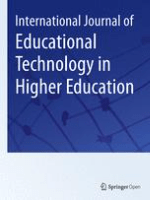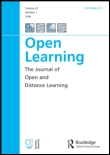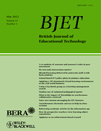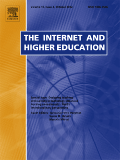
International Journal of Educational Technology in Higher Education
Scope & Guideline
Advancing educational practices with cutting-edge research.
Introduction
Aims and Scopes
- Integration of Artificial Intelligence in Education:
Explores how AI tools and applications are being utilized in higher education to enhance teaching methodologies, student engagement, and assessment strategies. - E-Learning and Digital Pedagogy:
Investigates various e-learning platforms and pedagogical approaches, including flipped classrooms and blended learning, to understand their effectiveness in improving learning outcomes. - Student Engagement and Emotional Presence:
Focuses on the role of emotional intelligence, engagement strategies, and collaborative learning in fostering a supportive and effective learning environment. - Learning Analytics and Data-Driven Insights:
Utilizes data analytics to explore learning behaviors, predict student performance, and improve educational practices through informed decision-making. - Generative AI and Assessment Technologies:
Examines the impact of generative AI on assessments, including the use of AI-generated feedback and its implications for academic integrity and educational practices. - Digital Literacy and Competence:
Addresses the importance of digital literacy among students and educators, emphasizing the need for skills that support effective engagement with technology in educational contexts.
Trending and Emerging
- Generative AI in Educational Settings:
A significant trend is the exploration of generative AI technologies, such as ChatGPT, and their influence on teaching, learning, and assessment practices, highlighting both opportunities and challenges. - Emotional and Social Aspects of Learning:
There is a growing focus on the emotional dynamics of learning environments, including how emotional presence and social interactions affect student engagement and academic performance. - Gamification and Game-Based Learning:
The use of gamification strategies is gaining traction, with research investigating how game elements can enhance motivation, engagement, and learning outcomes in higher education. - Learning Analytics for Personalization:
An increased emphasis on learning analytics is evident, with studies looking at how data can be utilized to personalize learning experiences and predict student success. - Equity and Accessibility in Education:
Emerging themes include a focus on equitable access to educational technology, particularly for marginalized groups, and the development of inclusive practices in higher education. - Interdisciplinary Approaches to Educational Technology:
There is a trend towards interdisciplinary research that combines insights from various fields, such as psychology, sociology, and technology, to enhance educational practices.
Declining or Waning
- Traditional Assessment Methods:
There appears to be a waning interest in conventional assessment methods, with a noticeable shift towards innovative and technology-enhanced assessment strategies that better reflect contemporary educational needs. - General E-Learning Overviews:
The journal has moved away from broad overviews of e-learning practices towards more specific studies that examine the nuanced impacts of technology on student learning and engagement. - Focus on Non-Technology-Based Pedagogies:
Research that does not incorporate technology in higher education pedagogy seems to be decreasing, reflecting a growing consensus on the necessity of integrating technology into educational practices. - Static Learning Environments:
There is less emphasis on traditional static learning environments, as more studies explore dynamic, interactive, and adaptable learning spaces that leverage technology. - Undergraduate-Focused Research:
The journal is increasingly focusing on graduate-level education and adult learning contexts, resulting in a decrease in research specifically targeting undergraduate student experiences.
Similar Journals

Research and Practice in Technology Enhanced Learning
Elevating educational experiences through rigorous research.Research and Practice in Technology Enhanced Learning is a leading international journal dedicated to advancing the field of educational technology and its applications in various learning environments. Published in Taiwan, this journal has firmly established itself as an open-access platform for sharing innovative research, practical insights, and emerging trends since its inception in 2015. With an impressive Q1 ranking in Education and Media Technology for 2023, coupled with notable placements in the fields of Social Psychology and Management of Technology and Innovation, the journal underscores its significance in fostering interdisciplinary collaboration among scholars and practitioners. Its rigorous peer-review process ensures the publication of high-quality articles that contribute substantively to both theoretical and practical knowledge. The journal's commitment to open access enhances its visibility and accessibility, making it an invaluable resource for researchers, educators, and students seeking to explore the intersection of technology and learning.

Open Learning
Cultivating Insight in E-Learning ExcellenceOpen Learning, published by Routledge Journals, Taylor & Francis Ltd, is a leading peer-reviewed journal in the field of education and e-learning, showcasing innovative research and practice since its inception in 1970. With a robust impact factor and consistently ranked in the Q1 category for both education and e-learning by Scopus, this esteemed journal positions itself at the forefront of academic dialogue, exploring the evolving landscape of digital and open learning environments. The journal's authoritative content and empirical studies serve as essential resources for researchers, educators, and students striving to enhance pedagogical strategies and educational outcomes in a rapidly changing technological world. Published quarterly, Open Learning remains committed to cultivating scholarly exchange and advancing knowledge within the global education community.

Innovacion Educativa-Mexico
Empowering educators to redefine learning experiences.Innovacion Educativa-Mexico is a premier academic journal dedicated to advancing the field of educational innovation, with a strong emphasis on practices and research that enhance learning outcomes in Mexico and beyond. Published by the Instituto Politécnico Nacional (IPN), this journal plays a crucial role in disseminating original research, case studies, and theoretical discussions that address contemporary challenges in education. With its ISSN 1665-2673 and E-ISSN 2594-0392, Innovacion Educativa-Mexico provides a valuable platform for scholars, educators, and practitioners to share their insights and foster collaboration aimed at improving educational systems. While it currently operates under a traditional access model, the journal’s commitment to quality and relevance is reflected in its ongoing efforts to maintain high academic standards. Residing at the heart of Mexico City, the journal is strategically positioned to address local educational challenges while contributing to the global dialogue on innovative pedagogical practices.

Contemporary Educational Technology
Shaping Tomorrow's Classrooms with Today’s InnovationsContemporary Educational Technology is a premier journal published by BASTAS PUBL LTD - UK, specializing in the dynamic intersection of educational practices and technological advancements. With an E-ISSN of 1309-517X, this journal serves as a vital resource for researchers, educators, and professionals keen to explore innovative solutions and methodologies in education. Ranked in the Q2 category for both Education and Management of Technology and Innovation in 2023, Contemporary Educational Technology boasts impressive Scopus ranks, standing at #187 out of 1543 in the Social Sciences Education field, reflecting its influence and contribution to contemporary research. Through its open-access approach, this journal facilitates the dissemination of knowledge, making cutting-edge research readily available to a global audience. By examining developments from 2018 through 2024, it aims to critically analyze and promote the integration of technology in educational contexts, thereby fostering improved learning outcomes and innovative teaching practices.

REDU-Revista de Docencia Universitaria
Transforming Higher Education Through Insightful ResearchREDU-Revista de Docencia Universitaria, published by UNIV POLITECNICA VALENCIA, EDITORIAL UPV, is a prominent open-access journal dedicated to advancing the field of higher education pedagogy. Established in 2008, this journal serves as a vital platform for academics and educators to share insightful research and innovative practices aimed at improving university teaching and learning. With a commitment to fostering educational excellence, REDU promotes a rich dialogue among researchers, professionals, and students across various disciplines. The journal is indexed by notable databases, ensuring wide visibility and accessibility of published works. By addressing contemporary challenges and developments in university instruction, REDU plays a crucial role in shaping educational methodologies and informing policies within the academic landscape.

Advances in Medical Education and Practice
Empowering Educators, Enriching Medical PracticeAdvances in Medical Education and Practice (ISSN: 1179-7258, E-ISSN: 1179-7258) is a prominent open-access journal, published by Dove Medical Press Ltd since 2010, with a specific focus on the evolving landscape of medical education and training. Based in the United Kingdom, this journal aims to disseminate high-quality research and innovative practices that enhance educational strategies in medical and health professions, providing a platform for scholars, educators, and practitioners to share advancements that influence curriculum development, teaching methodologies, and assessment techniques. With impressive rankings in Scopus, positioned in the top quartile of educational journals (Q2 in Education, Rank #517/1543), and a respectable impact in the 66th percentile, it is a vital resource for those invested in enhancing the quality of medical education worldwide. Researchers, professionals, and students will find valuable insights in its comprehensive collection of articles, ensuring they stay at the forefront of advancements in medical education.

BRITISH JOURNAL OF EDUCATIONAL TECHNOLOGY
Transforming Education through Cutting-Edge ResearchBRITISH JOURNAL OF EDUCATIONAL TECHNOLOGY, published by Wiley, is a leading journal in the field of educational technology, recognized for its commitment to advancing research and practice in this dynamic arena. With an impressive impact factor that places it in the Q1 quartile for both Education and E-learning in 2023, it serves as a critical resource for academics, practitioners, and policymakers alike. This journal, with an established publication history since 1970, focuses on the integration of technology in educational settings, aiming to disseminate innovative findings and facilitate discussions that enhance learning experiences. Researchers contributing to the journal address diverse topics from digital learning environments to the pedagogical implications of emerging technologies, ensuring comprehensive coverage of the latest trends and methodologies. Submissions are welcomed in various formats, promoting collaborative scholarly dialogue in fostering effective educational practices. Access to the journal is available through traditional subscription frameworks, ensuring broad accessibility for institutions and individuals invested in the advancement of educational technology.

Open Praxis
Fostering collaboration in the realm of open education.Open Praxis, published by the International Council for Open and Distance Education, is a premier open-access journal dedicated to advancing the field of open and distance education. With its ISSN 2304-070X and E-ISSN 2304-070X, Open Praxis has been providing a platform for rigorous research and innovative practice since 2013, catering to an expanding audience of researchers, educators, and policy-makers interested in the latest advancements in educational methodologies and technologies. The journal is indexed in Scopus, achieving impressive rankings within both the Library and Information Sciences (Rank #72/280, Percentile 74th) and Education (Rank #453/1543, Percentile 70th) categories, highlighting its significant impact in the academic community. Operating under a commitment to open access principles, Open Praxis facilitates knowledge dissemination and collaboration, making vital research accessible to a global audience. Scholars aiming to stay at the forefront of open and distance learning are invited to engage with this journal, which serves as a critical resource for emerging trends, challenges, and solutions in education.

Internet and Higher Education
Transforming Education through Digital InnovationWelcome to Internet and Higher Education, a premier journal published by Elsevier Science Inc, focusing on the dynamic intersection of technology and education. Established in 1998, this journal provides a platform for innovative research and critical discussions in the fields of Computer Networks and Communications, Computer Science Applications, and E-learning, consistently ranked in the Q1 quartile across multiple categories in 2023. With an impressive Scopus ranking placing it in the top 1% of Social Sciences and Computer Science categories, Internet and Higher Education aims to foster interdisciplinary collaboration and advance our understanding of digital learning environments. The journal invites contributions that explore the impact of the internet on higher education, offering tangible insights for educators, administrators, and policymakers alike. Stay updated on the latest findings and trends that are shaping the future of education through technology.

Journal of Computing in Higher Education
Enhancing Teaching and Learning in a Digital Era.Journal of Computing in Higher Education, published by SPRINGER, stands as a pivotal peer-reviewed journal dedicated to advancing research and practices at the intersection of computing and higher education. With an impressive impact factor and classified in Q1 of the Education category for 2023, it ranks #18 out of 1543 in Scopus's Social Sciences _ Education category and #12 out of 232 in Computer Science, reflecting its substantial influence and high-quality contributions to the field. Established in 1989 and continuing to publish valuable insights through 2024, this journal serves as an essential resource for researchers, educators, and professionals keen on exploring innovative computing methodologies in higher education settings. Although not an open access journal, it provides critical findings and discussions that aim to enhance teaching, learning, and institutional practices in an increasingly digital landscape. Engaging with this journal equips readers with cutting-edge research, aiding their endeavors to shape the future of education through technology.